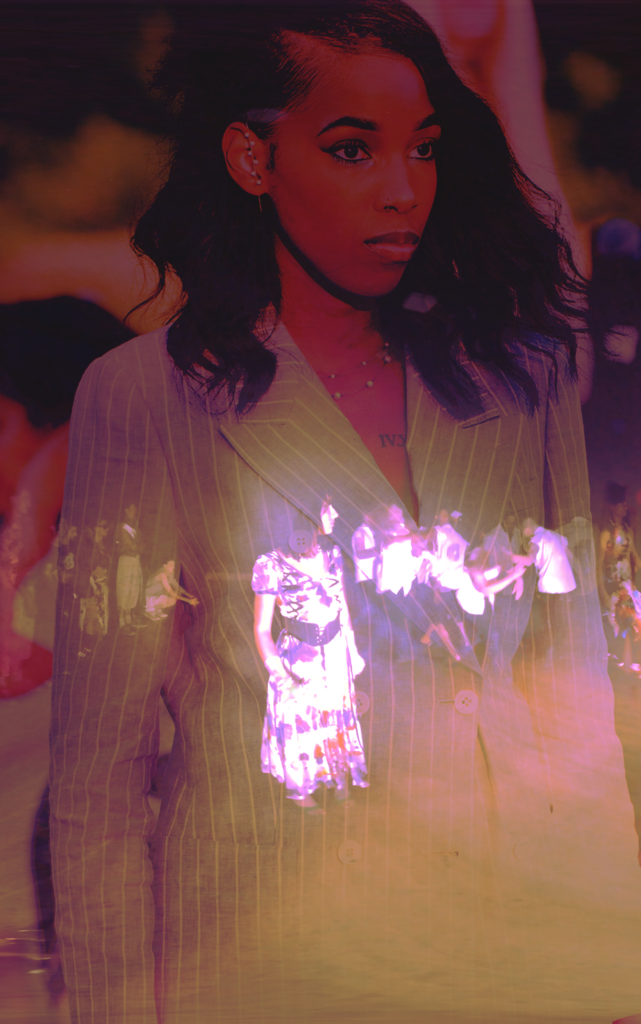Boulevard
Directed by Dan Shanahan and Melissa Meola
Virtual Reality by FLATSITTER
Nov. 4-5, 11-12, Dec. 1-3, 8, 10 2022
About Boulevard
Incorporating footage captured during CrossWalk, Torn Space’s summer fashion show and art party experience, this new performance explores layers of identity through the presentation of fashion, glamor, and power structures occurring in both public and private spaces. Combining symbols and archetypes from the Torn Space mythology with branded imagery from fashion designers BUREAU, OGLXRY, Vice Paradise and Kylie Priscilla, Boulevard observes the process of constructing the self in an age of hyper-connectivity, “influencer” personas and the omnipresent desire for self-optimization.
Audiences of 20 will experience the performance within two realms; the actual and the virtual. In the actual world we witness performers occupying their private spaces; they rest, make a drink, bide their time and confront one another. This equilibrium is fractured when a disturbing anonymous phone call is received, prompting the players to take refuge and gently slip into a fantasied and fetishized sense of self that occurs within virtual reality.
The choreography for the live performance is based upon Torn Space Theater’s 2017 staging of Harold Pinter’s The Collection.
Torn Space Staff
Artistic Director – Dan Shanahan
Associate Director – Melissa Meola
Production Manager – Carly Weiser
Assistant Technical Director – Daniel Toner
Managing Director – Marisa Caruso
Technical Director – Matthew DiVita
Audio Technician – Dan Neveu
Marketing & Social Media – Holly Kirkpatrick
Designers
VR Creation & Film – FLATSITTER
Costume Design – Joseph Stocker/BUREAU
Sound Design – Justin Rowland
Lighting Design – Eclectric Oil and Light
Set Design – David Mitchell
VR Fashion Designers – OGLXRY, Kylie Priscilla, Vice Paradise
Performers
Nikiya Garza
Justin Leis
Holly Kirkpatrick
Carmen Swans
Kalub Thompson
Boulevard used selected excerpts from the following text:
The Origins of Totalitarianism by Hannah Arendt
The Weight of the World by Peter Handke
Trick Mirror by Jia Tolentino
The Collection by Harold Pinter
Voice Over:
Holly Kirkpatrick
Masoumeh Mirzai
Diane Gaidry
………………………
Excerpts from Hannah Arendt’s The Origins of Totalitarianism were used in this production. We have included the text below for your reference.
“What we call isolation in the political sphere, is called loneliness in the sphere of social intercourse. Isolation and loneliness are not the same”…”While isolation concerns only the political realm of life, loneliness concerns life as a whole. Totalitarian government, like all tyrannies, certainly could not exist without destroying the public realm of life, that is, without destroying, by isolating men, their political capacities. But totalitarian domination as a form of government is not content with this isolation and destroys private life as well, it bases itself on loneliness, on the experience of not belonging to the world at all, which is the most radical and desperate experiences of man.”
“In an ever-changing, incomprehensible world the masses had reached the point where they would, at the same time, believe everything and nothing, think that everything was possible and that nothing was true.”
“Mass propaganda discovered that its audience was ready at all times to believe the worst, no matter how absurd, and did not particularly object to being deceived because it held every statement to be a lie anyhow. The totalitarian mass leaders based their propaganda on the correct psychological assumption that, under such conditions, one could make people believe the most fantastic statements one day, and trust that if the next day they were given irrefutable proof of their falsehood, they would take refuge in cynicism; instead of deserting the leaders who had lied to them, they would protest that they had known all along that the statement was a lie and would admire the leaders for their superior tactical cleverness.”
“To them, violence, power, cruelty, were the supreme capacities of men who had definitely lost their place in the universe and were much too proud to long for a power theory that would safely bring them back and reintegrate them into the world. They were satisfied with blind partisanship in anything that respectable society had banned, regardless of theory or content, and they elevated cruelty to a major virtue because it contradicted society’s humanitarian and liberal hypocrisy.”
“The truth is that the masses grew out of the fragments of a highly atomized society whose competitive structure and concomitant loneliness of the individual had been held in check only through membership in a class. The chief characteristic of the mass man is not brutality and backwardness, but his isolation and lack of normal social relationships. Coming from the class-ridden society of the nation-state, whose cracks had been cemented with nationalistic sentiment, it is only natural that these masses, in the first helplessness of their new experience, have tended toward an especially violent nationalism, to which mass leaders have yielded against their own instincts and purposes for purely demagogic reasons.”
“Terror can rule absolutely only over men who are isolated against each other… Therefore, one of the primary concerns of all tyrannical governments is to bring this isolation about. Isolation may be the beginning of terror; it certainly is its most fertile ground; it always is its result. This isolation is, as it were, pre totalitarian; its hallmark is impotence insofar as power always comes from men acting together…; isolated men are powerless by definition.”
“In isolation, man remains in contact with the world as the human artifice; only when the most elementary form of human creativity, which is the capacity to add something of one’s own to the common world, is destroyed, isolation becomes altogether unbearable… Isolation then becomes loneliness.”
“It bases itself on loneliness, on the experience of not belonging to the world at all, which is among the most radical, and desperate experiences of man.”
“Loneliness, the common ground for terror…”
